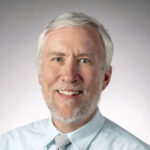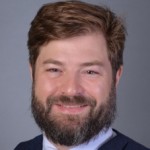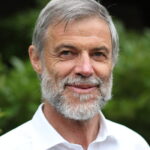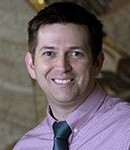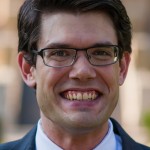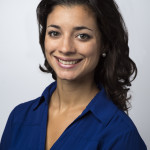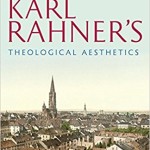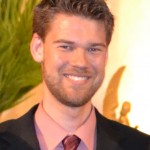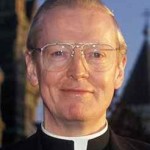Society to Discuss Karl Rahner’s Article on Salvation
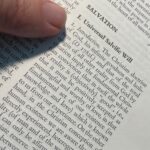 The 2024 Rahner Breakfast will focus on Karl Rahner’s article from the 1970 Sacramentum Mundi, “Salvation.” Although Ingrid Maisch, Klaus Berger, Adolf Darlap, and Franz Lakner contributed to the article, an outline of it shows that Rahner wrote almost two-thirds of the article. Brandon Peterson (of the University of Utah), Coordinator of the KRS Steering Committee, will suggest ways to coordinate Rahner’s thinking with the theme of the CTSA convention, “Social Salvation.” He has proposed three questions:
The 2024 Rahner Breakfast will focus on Karl Rahner’s article from the 1970 Sacramentum Mundi, “Salvation.” Although Ingrid Maisch, Klaus Berger, Adolf Darlap, and Franz Lakner contributed to the article, an outline of it shows that Rahner wrote almost two-thirds of the article. Brandon Peterson (of the University of Utah), Coordinator of the KRS Steering Committee, will suggest ways to coordinate Rahner’s thinking with the theme of the CTSA convention, “Social Salvation.” He has proposed three questions:
- What does Rahner’s theology here tell us about the social dimension of salvation?
- How has this piece aged after fifty+ years? Does it have insights which haven’t been fully appreciated? Does it have blind spots? Areas to build on?
- How does Rahner’s theology of salvation relate to other dimensions of his thought?
He and Mark Fischer (editor of the “Rahner Papers” within Philosophy and Theology) will offer some brief remarks to introduce the article. This will be followed by a discussion.
The Rahner Breakfast will also elect two members to the Coordinating Committee. Michael Rubbelke (College of Saint Benedict and Saint John’s University) and Grace Agolia (Boston College) have accepted nominations.
x
J. Matthew Ashley’s Renewing Theology a Focus at the 2023 Breakfast
The 2023 breakfast examined the book Renewing Theology: Ignatian Spirituality and Karl Rahner, Ignacio Ellacuría, and Pope Francis. Author J. Matthew Ashley (University of Notre Dame) discussed his book with Peter Joseph Fritz (Holy Cross University). Ashley had posed the question, “How is spirituality related to the practice of theology?” He believes the question is urgent because spirituality is often treated separately from academic theology, as if the two have nothing in common. Ashley answered his question by turning to the spirituality of St. Ignatius of Loyola, as expressed in the writings of Karl Rahner, Ignacio Ellacuría, and Pope Francis (Jorge Mario Bergoglio).
The starting point of Ashley’s book is what he calls “the widening separation between spirituality and academic theology in the Christian West.” After an introductory discussion of “The Poverty of Academic Theology,” he treats the topic of “Modernity and the Origins of Spirituality” in chapter 1. The next two chapters provide a historical overview of Ignatian spirituality and, in relation to it, the limits of “modernity.” Chapters 4, 5, and 6 consider three Jesuits —Rahner, Ellacuría, and Pope Francis — and their responses to the challenges of modernity. Chapter 7, “Ignatius and the Theologians,” suggests that theology inspired by Ignatius helps to close the gap between spirituality and the academy.
Peter Fritz lauded Ashley’s project of a renewal of theology based on “fundamental intuitions” and “basic attunements” such as Ignatian consolation. He defined the various terms of Ashley’s proposal, summarized his argument, and concluded with an affirmation of the “Ignatian Spiritual Event” as Ashley defined it. In Fritz’s view, Ashley’s vision of a renewed theology follows the method of Rahner. By unfolding Christian thought, theology becomes a spiritual event in the Ignatian style.
x
2022 Breakfast to Consider Rahner’s An Ecumenical Priesthood
The June 11 Karl Rahner Society Breakfast, taking place within the annual convention of the Catholic Theological Society of America in Atlanta, will discuss a new translation of Rahner’s An Ecumenical Priesthood by Jacob Karl Rinderknecht (University of the Divine Word in San Antonio).
Breakfast Agenda for Saturday, June 11, 2022 7:15 – 8:45 AM (EDT)
- Welcome and Opening Prayer (Mark Fischer, St. John’s Seminary, Camarillo).
- Introduction of members of the Steering Committee: Brandon Peterson (University of Utah), Michael Canaris (Loyola Chicago), and Mary Beth Young (Neumann University).
- Acknowledgement of Presenters at the Rahner Consultation: Peter Joseph Fritz (Holy Cross College), Maeve Heaney (Australian Catholic University), and Anthony Godzieba (Villanova University).
- Rahner and the Bible (7:30). On February 25 and 26, 2022, Peter Joseph Fritz participated in the symposium “Rahner and the Bible” and will offer his reflections.
- Business Meeting (7:35).
- The KRS Steering Committee.
- Acknowledgment of Outgoing member Erin Kidd (St. John’s University, New York).
- Selection of New Steering Committee member.
- Nomination of Jakob Rinderknecht directs the Pastoral Institute and is Associate Professor of Religious Studies at the University of the Incarnate Word in San Antonio.
- Other Nominations?
- Voting procedure according to the KRS Constitution.
- Rahner’s An Ecumenical Priesthood (7:50). Jakob Rinderknecht’s translation of An Ecumenical Priesthood: The Spirit of God and the Structure of the Church is coming out in August from Fortress Press. His presentation will be followed by a discussion, brainstorming, and questions and answers.
- Closing Remarks (8:35).
- The Rahner Papers. The Marquette University Journal Philosophy and Theology publishes the “Rahner Papers” and invites submissions.
- 2023 CTSA Convention Theme. Next year’s convention theme is “Freedom” and the Steering Committee invites KRS members to share their thoughts about this theme with the Steering Committee in preparation for the Rahner Consultation “Call for Papers.”
2021 “Rahner Event” to Consider Rahner and the Bible
Instead of a Rahner Breakfast, the 2021 online convention of the Catholic Theological Society of America will feature a “Rahner Event.” The event will take place on Thursday, June 10, from 8:30 to 10:00 (Pacific Daylight Time), and will feature a discussion of “Rahner and the Bible.” The discussion will include an overview of the topic by Benedikt Collinet and Georg Fischer, SJ.
Collinet and Fischer coordinate the project “Karl Rahner and the Bible” at the Institut für Bibelwissenschaften und Historische Theologie within the University of Innsbruck. Their website explains the origin of the project. A few years after Rahner’s death, some accused him of not being interested in the Bible itself, but only of using it philosophically. Others claimed that he was not at all interested in Judaism or Old Testament theology. Collinet and Fischer, however, believe that Rahner was engaged in New Testament research and used the Bible in his sermons. They believe that Rahner’s approach to the Bible and its hermeneutics is more differentiated than has previously been shown.
Participants at the “Rahner Event” will be able to engage Collinet and Fischer regarding their three leading questions: (1) How does Rahner use the Bible and in what way does he interpret it? (2) Which biographical or academic approaches did Rahner have? (3) What are the contexts of his interpretations and how do they relate to his work in general?
For the agenda to the June 10 “Rahner Event,” please click here.
x
x
2018 Breakfast Considers Rahner’s Influence on Recent Dissertations
More than 30 members of the Karl Rahner Society met at the Marriott Indianapolis Downtown Hotel on June 9, 2018 for the society’s annual breakfast. Richard Lennan (Boston College) opened the gathering at 7:20 AM by introducing a panel of scholars who are working on their doctorates or have recently finished them: Brent Little (Sacred Heart in Fairfield), Elyse Raby (Boston College), and Michael Rubbelke (Notre Dame).
Brent Little discussed Shusaku Endo’s novel “Deep River,” describing it as an expression of grace in the symbolic form of fiction (as distinct from grace in the ecclesial context). In 2015, Little had defended a dissertation at Loyola University Chicago entitled “Uncertainty and Faith: The Dynamics of Belief in Theology and Literature,” which relied on Rahner’s theology of grace and anthropology.
Michael Rubbelke described his research on Rahner’s understanding of mysticism. Rahner viewed mysticism in terms of the German mystical tradition, he said, which is distinct from the better-known tradition mediated by Saints Augustine and Thomas. Rubbelke expected to defend within the month his dissertation, “‘A Constant Closeness to This God’: Reconsidering Karl Rahner’s Mystical Theology.”
Elyse Raby applied Rahner’s theology of the Realsymbol to the question of gender identity. If a Realsymbol is the outer expression of a metaphysical reality that gradually seeks to become itself, she said, then the concept can enrich the contemporary discussion (which often defines gender simplistically as something assigned at birth). Raby warned against a mind-body dualism that subordinates the mind and spirit to the body.
After the panel’s presentation and a brief discussion by society members, Richard Penaskovic (Auburn University) nominated Brandon Petersen (University of Utah) to serve on the KRS Steering Committee. Petersen accepted the nomination and was unanimously elected to a three-year term, replacing Peter Joseph Fritz (Holy Cross). Michael Canaris (Loyola Chicago), who had completed one three-year term, also accepted nomination and was elected for a second term.
Fritz had recently returned from a sabbatical in Germany. He described a celebration in Munich that he had attended on the completion of the 32-volume series of Rahner’s Sämtliche Werke. Members expressed a desire to see in English the critical introductions to each volume.
Mark F. Fischer (St. John’s Seminary, Camarillo) reported on the “Rahner Papers” which he edits. The Rahner Papers occupy a section of the Marquette University Journal, “Philosophy and Theology.” Fischer also delivered a brief remembrance of Father Melvin Michalski (1943-2018), who had served on the KRS Steering Committee and co-authored (with Andreas Batlogg) “Encounters with Karl Rahner.”
Richard Lennan concluded the breakfast by reminding KRS members about the CTSA convention in Pittsburgh, June 6-9, 2019. The convention theme is “Another World is Possible: Violence, Resistance and Transformation.” Based on that theme, said Lennan, the KRS would develop a call for papers to the CTSA’s Rahner consultation.
2017 Breakfast Discusses Karl Rahner’s Theological Aesthetics
25 members of the Catholic Theological Society of America attended the Karl Rahner Society breakfast on Saturday, June 10, 2017, at the Hyatt Regency Hotel in Albuquerque. Richard Lennan (Boston College), the Coordinator of the KRS Steering Committee, convened the session at 7:15 AM and welcomed the members. He invited Denis Edwards (Australian Catholic University) to lead the group in prayer, and together the members read portions of Rahner’s essay “The Festival of the Future of the World” (Theological Investigations 7) and “God Who Is to Come” (from Encounters with Silence).
A discussion of a book published in 2014 by KRS member Peter Joseph Fritz, Karl Rahner’s Theological Aesthetics (CUA Press), was the principal business of the breakfast. Mark F. Fischer (St. John’s Seminary, Camarillo) praised the book for transporting readers “into the intellectual milieu that gave rise to Rahner’s Spirit in the World.” Fischer summarized Fritz’s main argument, which is that Rahner’s work implies a “theological aesthetics.” Although Spirit in the World had analyzed the metaphysics of human knowledge as expressed in Thomas Aquinas, Rahner’s work is as much about aesthetics as metaphysics. The “theological aesthetics” of Fritz focuses attention on how the imagination interprets sense impressions and thereby bridges the chasm between tangible reality and the intangible God. Fritz’s book, said Fischer, “has translated the medieval language, grasped the Thomistic insight, and shown its relevance.”
Robert Masson (Marquette University) highlighted what Fritz called the “counter-subjective character” of Karl Rahner’s Theological Aesthetics. The word subjectivism suggests a preoccupation with the limited capacity of the knower. An extreme form of such a preoccupation denies the human capacity to know God, said Masson, and “closes off any possibility for God’s self-manifestation.” Fritz identified subjectivism with the philosophies influenced by Immanuel Kant. Masson admired Fritz’s analysis, which showed that Rahner enlisted Heidegger as an ally in his rejection of subjectivism. By rejecting Kantian subjectivity, Rahner remained open to God’s self-communication.
At the same time, however, both Masson and Fischer criticized Fritz’s blunt characterization of Rahner as “breaking” with Heidegger. In the analysis of Fritz, Heidegger advocated an “apriorism of finitude” that denied human access to the infinite God. Rahner’s metaphysics of human knowledge, by contrast, showed that sensation, interpreted by the imagination, in fact opens the human being to the infinite. Masson and Fischer, however, doubted the wisdom of simply pitting Rahner against Heidegger. The one was a Catholic theologian, the other a philosopher, said Fischer, and that clarifies the difference between Rahner’s infinite God and the finite being of Heidegger. At least the explicit motive of Heidegger was always to bring something “elusive” to thought, said Masson, rather than to prescribe human limits a priori.
Peter Joseph Fritz (Holy Cross College) thanked Fischer and Masson and explained the genesis of the title of his book (which was originally called The Catholic Sublime). He changed the book’s title because it might have wrongly implied a theory of art (or even an aesthetic theology), rather than “an account of the manifestation of being.” Defining aesthetics as such an “account,” he said, now seems unduly abstract. Fritz proposed a more precise definition. Aesthetics, he said, is Rahner’s “discourse on incomprehensible Mystery’s revelation to and through the human imagination,” an imagination capable of receiving God’s own life. This more concrete definition, concluded Fritz, renders justice to Immanuel Kant. From Kant, Rahner learned how the human imagination “stretches forth toward the infinite” and directs the human subject toward the “supersensible stratum.”
Following the conversation about Karl Rahner’s Theological Aesthetics, the breakfast participants discussed the theme of the 2018 CTSA convention in Indianapolis with its theme of “Grace at Work in the World.” The members brainstormed possible topics for next year’s Karl Rahner consultation. Stephan Weber of the Herder Press announced that the final volume in Rahner’s Sämtliche Werke would be published to coincide with the 114th birthday of Rahner on March 5, 2018. The meeting adjourned at 8:30.
2016 Breakfast Elects New Coordinator
 Richard Lennan (Boston College School of Theology and Ministry) was elected Coordinator of the Karl Rahner Society Steering Committee at the society’s annual breakfast meeting, which took place on June 11 at the Caribe Hilton in San Juan. Lennan has completed a three-year term on the Steering Committee and will serve as Coordinator for the next three years.
Richard Lennan (Boston College School of Theology and Ministry) was elected Coordinator of the Karl Rahner Society Steering Committee at the society’s annual breakfast meeting, which took place on June 11 at the Caribe Hilton in San Juan. Lennan has completed a three-year term on the Steering Committee and will serve as Coordinator for the next three years.
Outgoing Coordinator Mark F. Fischer (St. John’s Seminary, Camarillo) welcomed 32 members of the society to the breakfast meeting at 7:15 AM. He introduced the two speakers scheduled to present their papers at the afternoon’s Rahner Consultation, Matthew R. Petrusek (Loyola Marymount University) and Paul D. Murray (University of Durham). Fischer then gave a membership report, saying that there are currently 47 members in the KRS.
Next, Leo J. O’Donovan, SJ (Georgetown University) led participants in a prayer and remembrance of Rahner. He included a text from the President of Georgetown on the award to Rahner in 1974 of the Degree of Doctor of Laws, and commented on a photo of Rahner and a woodcut of the crucifixion by Georges Rouault. He concluded with a passage from Rahner’s book of prayers, Encounters with Silence.
Dr. Stephan Weber, an editor at Herder Verlag who is responsible for Rahner’s Sämtliche Werke, read to participants a Welcome Address from Karl Cardinal Lehmann of the Karl-Rahner-Stiftung in Munich. Weber reported that a French version of the collected works is forthcoming and that an English edition is desirable.
Following that, Richard Lennan and Ernesto Valiente (Boston College School of Theology and Ministry) led the participants in a reflection on Rahner’s understanding of popular piety. Lennan summarized Rahner’s 1979 article on “The Relation between Theology and Popular Religion” (Theo. Inv. 22: 140-147) and Valiente described the relation between Theology and Popular Religion in Puerto Rico and the Caribbean.
Fischer then nominated KRS Steering Committee members Lennan and Nancy Dallavalle (Fairfield University), both of whom have completed three-year terms on the committee, to additional three-year terms. The members elected them by voice vote. Fischer, who has completed a three-year term as Steering Committee Coordinator, then nominated Lennan to succeed him as Coordinator, and Lennan was elected.
As editor of the Rahner Papers published in Philosophy and Theology, Richard Penaskovic (Auburn University) invited members of the KRS to volunteer to be readers of papers submitted for publication, and several indicated a willingness to help.
Next year’s CTSA theme is “Ecology: Theological Investigations.” Breakfast participants were invited to brainstorm about papers for the Rahner Consultation that would be most helpful to KRS members. The following were suggested before the meeting adjourned at 8:45.
- Incarnation and ecology. The Word became flesh so that we might become enfleshed spirits who are “of” the earth and responsible for it.
- Resurrection. It is not just the one-time experience of Jesus, but the hope of every Christian for an ever-more-perfect communion with God.
- Grace. Is the concept of grace in Rahner’s theology broad enough to express God’s concern for all of creation?
- Evolution. Rahner spoke of Jesus Christ from an evolutionary viewpoint. How does Rahner’s concept of evolution compare to that of Teilhard de Chardin and Darwin?
- Hominisation. How is Rahner’s book on the process by which human beings reach their goal in Christ relevant to the theme of ecology?
- Trinity. Catherine LaCugna advanced Rahner’s theology of the Trinity by emphasizing the diversity among the Persons within the godhead as a divine ecology.
- Resource. Michael Petty’s A Faith that Loves the Earth is a resource for the theme of Rahner and ecology. So is the theology of Dennis Edwards.
- Creation. Rahner’s concept of the self-communication of God is relevant to a Christian view of ecology, as is his theology of symbol.
2015 Breakfast Elects New Steering Committee Members
The 2015 Karl Rahner breakfast took place on June 13 at the Hyatt Regency Hotel in Milwaukee as part of the annual convention of the Catholic Theological Society of America. The Breakfast Agenda 2015 started with an opening prayer and remembrance of Rahner by Jerry T. Farmer (Xavier University of Louisiana). It also included an appreciation by Peter J. Fritz (College of the Holy Cross) of James C. Bacik’s Humble Confidence: Spiritual and Pastoral Guidance from Karl Rahner (Liturgical Press, 2014).
Coordinator Mark F. Fischer (St. John’s Seminary, Camarillo) announced that Steering Committee member Paulette Skiba, BVM (Clarke University) has completed her second three-year term. He thanked Skiba for her many contributions to the society, for which she has served as membership coordinator. Peter J. Fritz had also completed his first three-year term. Fischer nominated him for a second term and he was elected by acclamation. Coordinator emerita Heidi Russell nominated Michael M. Canaris (Loyola University Chicago) to serve on the committee, and the 42 assembled members elected him by acclamation.
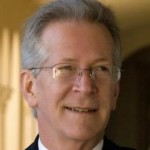 At the breakfast, Fischer offered his reflections on “Soteriologies of Rahner and Balthasar.” He described the difference between the two understandings of salvation by Jesus Christ. Rahner was critical of traditional soteriology, Fischer argued, including the popular theories of satisfaction and vicarious atonement. Rahner feared that these theories could be misunderstood as a ransom paid to the devil, or as a depiction (however inadequate) of God’s justice, or as a demand for reparation as the condition for forgiveness. These misinterpretations of the satisfaction theory are so popular, and Rahner’s critique so radical, that the critique almost seems to contradict the sensus fidelium.
At the breakfast, Fischer offered his reflections on “Soteriologies of Rahner and Balthasar.” He described the difference between the two understandings of salvation by Jesus Christ. Rahner was critical of traditional soteriology, Fischer argued, including the popular theories of satisfaction and vicarious atonement. Rahner feared that these theories could be misunderstood as a ransom paid to the devil, or as a depiction (however inadequate) of God’s justice, or as a demand for reparation as the condition for forgiveness. These misinterpretations of the satisfaction theory are so popular, and Rahner’s critique so radical, that the critique almost seems to contradict the sensus fidelium.
By contrast, Hans Urs von Balthasar strongly emphasized the vicarious atonement. His soteriology reflected what Rahner called the “official Christology” of the Church, and in that sense, may seem to better reflect the sensus fidelium. Balthasar’s soteriology expressed the view that Christ was sent as a sacrifice to repair the gap between humanity and God. In affirming this, Balthasar posited a difference between the Trinity as it appeared in history (the economic Trinity) and the Trinity in itself (the immanent Trinity). Rahner had equated the two, and so has (in Fischer’s view) the superior insight.
Partisans of Rahner and Balthasar tend to heighten their differences, said Fischer, who prefers to see convergences. His reflections showed that both theologians, however different, held that salvation stems from the Trinitarian God working with and through human beings.
2014 Breakfast Focused on Rahner’s Early Works and on Unity in Multiplicity
The 2014 Karl Rahner Breakfast took place on June 7, 2014 in the Manchester Grand Hyatt in San Diego. The 2015 breakfast will take place on June 13 at the Hyatt Regency Milwaukee.
Last year’s breakfast began with a presentation by Brandon Peterson, a recent graduate of the University of Notre Dame who began teaching in the fall of 2014 at the University of Utah. Peterson has written an essay about “Early Rahner: Reconsidering the Value of ‘E latere Christi.'” From the Side of Christ was the title of Rahner’s dissertation of 1936, which was not published until 1999 (in the Sämtliche Werke edition of Rahner’s publications). Peterson showed that “E latere Christi” anticipates many of Rahner’s later themes, such as the theology of the symbol.
Peterson also presented an overview of Volume 3 of the Sämtliche Werke, a volume entitled Spiritualität und Theologie der Kirchenväter. Although Karl Rahner is not often associated with the study of early Christian theology, Peterson said, the first fifteen or so years of his theological career were marked by a prolonged and intense engagement with the Church Fathers. In addition to “E later Christi,” the third volume of Rahner’s Sämtliche Werke comprises several of his significant writings from this period. Included are Rahner’s translation and expansion of a French textbook on patristic spirituality (1939), and several articles and book reviews, along with detailed introductions from Karl Neufeld and Andreas Batlogg.
Peterson’s talk was followed by “Karl Rahner on Unity that Differentiates,” presented by Leo O’Donovan. He said that Rahner consistently sought “to disclose the unity behind the multiplicity of experience and of doctrine as well, emphasizing at the same time the singularity and uniqueness embedded in the evolutionary process of a graced creation.”
O’Donovan discussed Rahner’s doctrine of God, which famously argued (in O’Donovan’s words) that “Christian theology has basically to do not with many, hitherto unknown ‘mysteries’ but rather with the one, all-embracing mystery of God’s self-communication in the two modes of incarnation and grace.” The theme of the unity that differentiates also has anthropological, ecclesiological, and aesthetic dimensions, all of which O’Donovan has sketched in a document entitled Unity that Differentiates.
The breakfast meeting concluded with a vote by assembled members on a proposal by Steering Committee member Paulette Skiba, BVM (Clarke University). The proposal added to the KRS By-Laws a provision for a category of Emeritus Membership. See KRS By-Law, Article 3.
